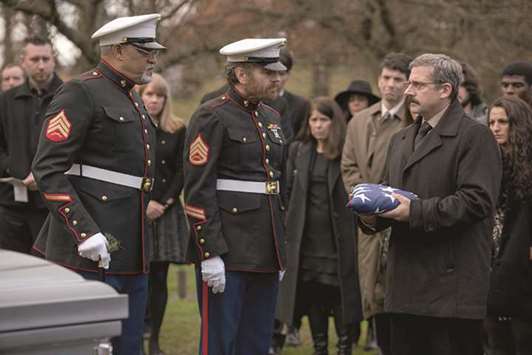Making a great motion picture isn’t that difficult. All it really takes are two things. There must be a cast made up of actors who can handle any demand, from a heart-pounding moment of drama to a free-for-all comedy assault. It’s also mandatory to have a script that evokes real emotions without being cloying, takes a smart look at life without coming across as seeing the world through a superior viewpoint and presents dialogue rich in subtleties delivered in a real world manner.
Why there isn’t an assembly line of great movies being cranked out comes down to productions not having one or both of those elements. Even a 90 percent effort on both doesn’t play out to pure greatness.
Richard Linklater’s Last Flag Flying is so rich in the two elements that it deserves a place on the list of the best films of the year. It’s a marvellous tale of friendship, family, duty, respect, pain and fear that comes to life through the sterling performance by Steve Carell, Laurence Fishburne and Bryan Cranston.
In 2003, former Navy Corps medic Richard “Doc” Shepherd (Carell) tracks down ex-Marines Sal (Cranston) and Mueller (Fishburne), two men he served with during the Vietnam War 30 years earlier. Shepherd hasn’t seen the two men for decades but enlists them in the solemn duty of helping him transport and bury his son, a young Marine killed in the Iraq War. Although both men have gone on to very different lives, they finally agree to help.
There are some funny moments in Last Flag Flying, usually the result of some passionate and painfully honest declaration by Cranston’s character about everything from the military to religion. His rants could have overpowered the story but having Fishburne play a preacher gives the movie a nice balance. Linklater was smart enough to recognise that Carell is at his best when he’s forced to play a confined role. That doesn’t mean his emotional waves are not grand, it just means that Carell can show the deep pain of a father losing a son with just a look.
Watching Cranston, Fishburne and Carell give life to Linklater’s words is like getting to watch three master painters at work. Each attacks the canvas with a very different style but what they create together is made stronger by the other.
The film is set in 2003, but Linklater shows through comparisons between the war in Iraq and the Vietnam War that the way soldiers fight battles may change but the effect war has on those who serve has not changed. It’s how those soldiers deal with the aftermath that is the core of the story. – Tribune News Service

MOVING: Richard Shepherd, played by Steve Carell, in the scene of the burial of his son. It’s an engaging tale of friendship, family, duty, respect, pain and fear.
